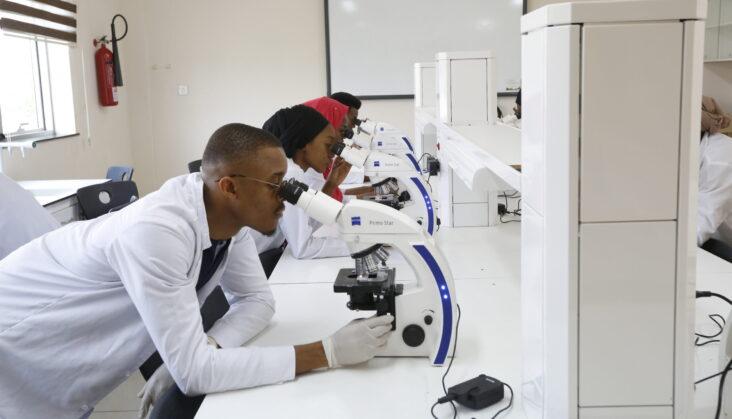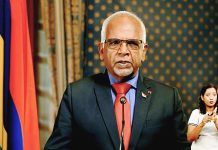Africa-Press – Mauritius. Africa’s population will double by 2050.
The continent and its vast pool of exceptionally young human capital – with a median age of 19.7 years – is gifted with an historic opportunity for sustained economic development.
One of the key factors in realizing this growth is the widening of access to higher education – however, there are legitimate questions to be asked about what kind of education is on offer and who gains access to it.
It is abundantly clear that over recent years the volume of available higher education seats in Africa has increased. The number of Africans enrolled at tertiary education institutions has doubled from six million to 12 million over the past 15 years.
Access has certainly been widened by the growth of institutions in the private sector – around 21% of young Africans in higher education attend private institutions. Their role as private providers of consistent, high quality education delivered by excellent teachers is critical and will grow exponentially.
The World Economic Forum predicts that between 2017 and 2022, the private education market will grow by over $2bn.
Whilst that figure represents a significant contribution of 12.5% to the estimated funding gap of around $16bn (Stanford Social Innovation Review) there is scope for much higher participation in private sector provision.
This provision must, however, be structured in such a way that it is accessible, affordable and relevant to as many people as possible. The latter requirement – relevance – is of paramount importance.
How do we educate an entire continent in a way that prepares its citizens for the technologically advanced, highly competitive and globalised nature of the 21st century world of work? The answer is evident in the word ‘globalised’.
Today’s world economy is built upon a complex network of international supply chains and services that exist either in distant factories or cyberspace, making geography increasingly irrelevant, which is why African graduates (like other graduates) must compete on a global stage.
The nature of tertiary education should, therefore, be international. Educators have a duty to impart students with a mobile and digitally well-equipped mindset in both a local and global context.
But what does globalisation means in the African context mean? Should we be promoting global careers when what African countries really need is home-grown jobs and skills development?
As educators, we should question what kind of globalisation might be best suited to African needs – because what works for economies in North Africa doesn’t necessarily work for those in Southern Africa – or the wildly differing East and West Africa nations.
Some will ask, is it wise for us educationists to create what some may view as a ‘one size fits all’ approach to higher education? Is a pan-African network like Honoris United Universities what Africa really needs?
These are fair questions because the Honoris network is growing rapidly, taking under its wing tens of thousands of undergraduates. We have a responsibility towards each of them.
In only a few short years, Honoris has expanded its reach covering North, Central, West and Southern Africa, with learning centres across 60 campuses in 10 cities and with a student cohort of more than 45,000 people.
The Honoris network of institutions is creating a regional educational infrastructure that is capable of equipping all students – wherever they are – with a global outlook as well as a nuanced grasp of local and national socio-economic needs.
Localisation is an incredibly important concept in emerging and developing markets. It is central to a nation’s journey towards self-sufficiency and sustainable growth. And, for many African students, there is an innate desire to contribute to their own local communities.
Many graduates become entrepreneurs who create jobs and boost their local value chains through manufacturing or the development of new services, which is why none of us in education should forget the role of the entrepreneur in creating local and national jobs. As educators, it is important that we are able to provide students with the tools they need to excel locally, nationally, regionally and globally.
Collaborative intelligence means sharing academic data, intelligence, cultural practices and teaching pedagogies right across the network so that students in Morocco have the same multi-cultural awareness and appreciation of the world as their peers in South Africa or Mauritius.
Students – wherever they are – must also have access to each other’s facilities and services: this is the unique benefit of being within a university network without borders. As part of its strategic growth across Africa, Honoris is now entering into another Anglophone beacon market and its first in West Africa – Nigeria.
Figures from the World Data Atlas show that Nigeria’s population reached 200 million in 2018, with an astonishing 43.9% of the country under the age of 14.
It is a country with an extraordinarily large pool of human capital, providing the nation with enormous opportunity. For Honoris, welcoming the Nile University of Nigeria into its network provides it with a high-quality anchor in West Africa.
For Nile students, there are enormous opportunities for cultural and academic learning beyond the nation’s borders. Honoris looks forward to providing educational opportunities for the majority of young adults in Nigeria. The Nile University of Nigeria, which was established in 2009, already shares many of Honoris’ practical approaches.
It is career-minded in its outlook: Nile’s Students Industrial Work Experience Scheme provides work experience that is relevant to professional development (local and international) prior to graduation.
The development of this holistic, geographically-rounded teaching pedagogy at the Nile University is one of several reasons why it has joined the Honoris network.
It is also the first Honoris institution with its own stand-alone medical school, providing access to comprehensive world-class laboratories in clinical skills, physiology, pathology, biochemistry, microbiology, pharmacology and anatomy.
The school is a strong complement to Honoris’ other medical training facilities. These include the Honoris Medical Simulation Centre, which was developed and launched in 2018 in the heart of Tunis and trains more than 3,500 Health Science students annually.
Medical Simulation Centre in Tunis
This is a real-world pedagogy that reflects Honoris and Nile’s shared belief in developing healthcare professionals that will contribute to improving and developing the healthcare systems across the continent. These facilities offer students across the network comprehensive, high-level training within the healthcare space in Africa.
By joining the Honoris United Universities platform, Nile University students will have the opportunity for a much wider perspective on the region and gain greater access to learning experiences across the entire network.
The youth in Africa are graduating from higher education institutions properly equipped with the tools they need to achieve their full potential. Moreover, graduates will have what it takes to make a lasting, positive contribution to their families, communities and countries by contributing to sustained economic growth, innovation, enterprise and job creation.
These outcomes, in turn, lift the value chain along supply chains and improve chances of social mobility. These outcomes are a necessity because they form the basis of mass job creation through enterprise and innovation, and the upskilling of the country’s workforce.
If higher education institutions in Nigeria (and the wider region) can properly equip graduates for tomorrow’s technologically complex, ever-changing and highly competitive 21st century world of work, the prospects for the entire continent – including local communities large and small – will be much brighter.
For More News And Analysis About Mauritius Follow Africa-Press







